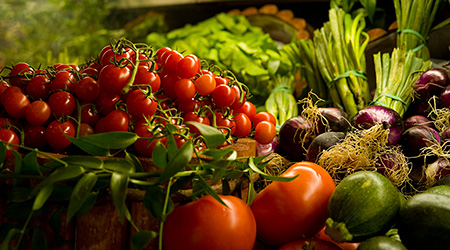How To Cut Your Veggie Bill

There is a reason why fruits and vegetables make up the majority of the federal government food pyramid and it has to do with nutrition and overall health. Vegetables provide essential vitamins and minerals in addition to valuable nutrients which help promote better health and reduce risks relating to cancer, improve circulation and maintain gastrointestinal function. When your parents told you as a kid to eat your vegetables it is a life lesson worth taking seriously. The question is how can you get the benefits of eating healthy while cutting the overall cost of your vegetable bill.
The unfortunate reality about vegetables is that much like fruits, they are highly susceptible to environmental changes such as extreme weather and natural disasters. Not only is there a cyclical nature to vegetable production, meaning they are only available at certain times of year, but even when a vegetable is "in season" there may be reduced production in cases of extreme heat or cold. Ideally consumers will always be able to buy fresh vegetables from a local farmers market or grocery store. In some circumstances however it may be necessary to use canned or frozen vegetables if there are no other alternatives. While not ideal, some vegetables are better than no vegetables.
As already mentioned, the majority a consumers' price savings will come when purchasing vegetables when they're in season. This is the absolute best way to cut your veggie bill as this is when vegetable prices will be lowest. The global economy has made more vegetables available more often and for lower prices but there will still be times when vegetables are literally dirt cheap. For example, many vegetables will have their peak harvest for around 4 to 6 weeks and in these scenarios you may see sweetcorn on sale for four for a dollar. During this time you should be eating a ton of corn. At other times cauliflower, Brussels sprouts and green beans will have their moments in the sun and will be similarly priced to move.
Another key to cutting your veggie bill is to comparison shop. This technique obviously is not limited to purchasing vegetables as it can be used for other products as well. Many retailers will offer price matching so even if your favorite grocery store doesn't currently have low prices on a particular vegetable another store may which allows you to price match and save significant money. Weekly circulars from grocery store chains often prominently advertise milk, fruits, meats and of course vegetables. The reason is that these perishable items often have a relatively short shelf life so grocery stores use weekly flyers to drive traffic in the hope that you'll come in for some milk and green beans and stay to buy hundreds of dollars worth of other goods. To cut your vegetable bill, obviously it is best to stick just to vegetables and maybe some fruits when you go to the store.
This might sound obvious but national grocery store chains are not the only ones that are allowed to sell vegetables on the open market. This point is more to address consumer behavior than specifically cutting your vegetable bill. More often than not consumers get into a comfort zone of shopping at only one grocery store which in the end will cost significantly more money than if they shopped around. Weekly fliers with price matching helps but that may only take you to one or two other stores. If you're lucky enough to have one in your hometown, be sure to shop the local farmers market. Farmers markets have become much more popular in recent times for the sole reason that they often offer fresher produce in a more timely fashion while helping support the local economy. In fact, all fruits and vegetables should be purchased at a local farmers market if at all possible instead of using a national grocery chain.
These are just some of the techniques on how to cut your veggie bill and others are available depending on how creative and how dedicated you are to saving money. Not only does reducing the cost of your vegetables free up additional financial resources to spend on more worthwhile endeavors but it also means you and your family will wind up eating healthier. The health benefits of fruits and vegetables can't be emphasized enough and should be a part of every individuals daily diet.
Elsewhere on StockMonkeys.com







